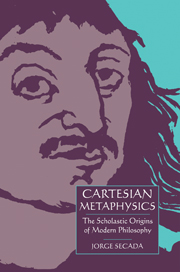Book contents
- Frontmatter
- Contents
- Preface
- Abbreviations
- Prologue
- Part I The unity of Cartesian metaphysics
- Part II Ideas and the road from essence to existence
- Part III Cartesian substances
- 7 The substantial tension
- 8 The essence and the existence of Cartesian substances
- 9 The real distinction or the body and the minds
- Epilogue
- Notes
- References
- Index
8 - The essence and the existence of Cartesian substances
Published online by Cambridge University Press: 22 September 2009
- Frontmatter
- Contents
- Preface
- Abbreviations
- Prologue
- Part I The unity of Cartesian metaphysics
- Part II Ideas and the road from essence to existence
- Part III Cartesian substances
- 7 The substantial tension
- 8 The essence and the existence of Cartesian substances
- 9 The real distinction or the body and the minds
- Epilogue
- Notes
- References
- Index
Summary
The essence of substances
Descartes wrote that ‘each substance has one principal property which constitutes its nature and essence and to which all its other properties are referred’ (AT, VIII–1, 25). In the last chapter we approached this claim from Descartes's discussion of substance. I propose that we now examine more closely his views about essence.
I use ‘property’ to mean the reference of a predicate term, whatever its category. Thus, corresponding to the five Cartesian categories of predicates, there are real properties, which may be essential or accidental, derivative or second-order properties, properly sensorial properties, and universal properties. I take Descartes to assert, in the sentence quoted above, that each substance has one essential property, and that all its other real properties are ‘referred’ to this one ‘principal’ property. Elsewhere, he claimed to understand ‘nothing without which something can exist to be included in its essence’ (AT, VII, 219; see also III, 423 and VIII–1, 347). The essential property of a substance is a property which the substance cannot cease to have without ceasing to be. A Cartesian substance is an actual essence, an existing nature that cannot pass away without taking the substance which it is with it.
Descartes is careful to present being a property a substance must have, if it exists, as a necessary (but possibly not sufficient) condition for being its essence.
- Type
- Chapter
- Information
- Cartesian MetaphysicsThe Scholastic Origins of Modern Philosophy, pp. 205 - 235Publisher: Cambridge University PressPrint publication year: 2000

